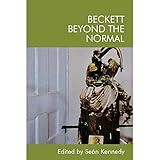Beckett Beyond the Normal / Seán Kennedy.
Material type: TextPublisher: Edinburgh : Edinburgh University Press, [2022]Copyright date: ©2020Description: 1 online resource (168 p.)Content type:
TextPublisher: Edinburgh : Edinburgh University Press, [2022]Copyright date: ©2020Description: 1 online resource (168 p.)Content type: - 9781474460460
- 9781474460484
- 828.91409 23
- PR6003.E282
- online - DeGruyter
| Item type | Current library | Call number | URL | Status | Notes | Barcode | |
|---|---|---|---|---|---|---|---|
 eBook
eBook
|
Biblioteca "Angelicum" Pont. Univ. S.Tommaso d'Aquino Nuvola online | online - DeGruyter (Browse shelf(Opens below)) | Online access | Not for loan (Accesso limitato) | Accesso per gli utenti autorizzati / Access for authorized users | (dgr)9781474460484 |
Frontmatter -- Contents -- Abbreviations -- ‘Here all is strange’: Beckett beyond the normal -- 1. Murphy and the Tao of Autism -- 2. Narrating Disruption: Realist Fiction and the Politics of Form in Watt -- 3. ‘no human shape’: Unformed Life in The Unnamable -- 4. Beckett, Evangelicalism and the Biopolitics of Famine -- 5. ‘He wants to know if it hurts!’: Suffering beyond Redemption in Waiting for Godot -- 6 ‘as if the sex matters’: Beckett, Barthes and Endgame in Love -- 7. Beckett’s Queer Time of Défaillance: Ritual and Resistance in Happy Days -- 8. Beckett’s Safe Words: Normalising Torture in How It Is -- Bibliography -- Notes on Contributors -- Index
restricted access online access with authorization star
http://purl.org/coar/access_right/c_16ec
Explores Beckett’s artistic vision at the intersection of queer, disability and posthumanist studiesThe first volume to address norms and normalcy as an enduring target of Beckettian skepticismShifts the emphasis from generic talk of ‘Other Becketts’ to specific accounts of the queer, the disabling, the abnormalising aspects of the mature worksAbsorbs and transcends the philosophy/history binary that has shaped the last twenty yearsBrings Beckett Studies into the twenty-first century as the first intersectional volume to address queerness, disability and biopolitics togetherThis book examines why Beckett’s writing is so queer, so disabled and disabling. Why did Beckett write so often about mental illness, disability, perversion? Why did he take such an interest in ‘abnormals’ and ‘degenerates’? How did he reconceive ‘the human’ in the wake of Hitler and Stalin? Drawing on Beckett’s voluminous archive, as well as his primary texts, the authors use psychoanalysis, queer theory, disability theory and biopolitics to push Beckett studies beyond the normal.
Mode of access: Internet via World Wide Web.
In English.
Description based on online resource; title from PDF title page (publisher's Web site, viewed 27. Jan 2023)


